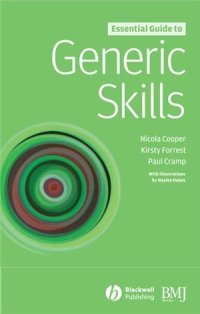
Ebook: Essential Guide to Generic Skills
It advises new doctors on note-keeping, time management/organisation, communicating with colleagues, the structure of the NHS, and how to deal with the ethical and legal issues they face when on-call.
Also looks at emotional intelligence, learning styles or how different personality types can work together more effectively.Content:
Chapter 1 Professionalism (pages 3–11):
Chapter 2 The Consultation (pages 12–21):
Chapter 3 Health Promotion (pages 22–28):
Chapter 4 Clinical Reasoning (pages 29–39):
Chapter 5 Communication With Colleagues (pages 40–47):
Chapter 6 Medical Records (pages 48–56):
Chapter 7 Prioritising Time (pages 57–62):
Chapter 8 Capacity and Consent (pages 65–75):
Chapter 9 The Mental Health Act and Common Law (pages 76–82):
Chapter 10 Confidentiality (pages 83–87):
Chapter 11 Death Certification and the Coroner (pages 88–93):
Chapter 12 Fitness to Drive (pages 94–99):
Chapter 13 Adult and Child Protection (pages 100–106):
Chapter 14 Ethical Principles in Healthcare (pages 107–111):
Chapter 15 Advance Directives (pages 112–116):
Chapter 16 End of Life Issues (pages 117–122):
Chapter 17 NHS Complaints Procedure (pages 123–126):
Chapter 18 Why Things Go Wrong (pages 129–138):
Chapter 19 Human Factors (pages 139–146):
Chapter 20 Safe Prescribing (pages 147–153):
Chapter 21 Infection Control (pages 154–162):
Chapter 22 Use of Evidence and Guidelines (pages 163–173):
Chapter 23 Audit (pages 174–179):
Chapter 24 Learning About Learning (pages 183–192):
Chapter 25 Teaching Large Groups (pages 193–198):
Chapter 26 Teaching Small Groups (pages 199–206):
Chapter 27 Presentations (pages 207–214):
Chapter 28 Teaching a Skill (pages 215–220):
Chapter 29 How to Give Feedback (pages 221–225):
Chapter 30 How Doctors are Assessed (pages 226–235):